The post A Global Push for Family Care: Securing a Strong UN Resolution on Early Childhood Development appeared first on Hope and Homes for Children.
]]>This September, the United Nations General Assembly (UNGA) will adopt a critical Resolution on Early Childhood Development (ECD), and we, together with our partners and allies are leading the charge to ensure it paves the way towards strong commitments for the end of child institutionalisation and the prioritisation of family-based care systems worldwide.
Hope and Homes for Children, alongside 13 partner NGOs, has launched a new report, The Right to a Good Start in Life, highlighting the vital link between Early Childhood Development (ECD) and family care. The report stresses that nurturing family environments are essential for children’s emotional security, cognitive growth, and overall well-being. It exposes the harm caused by institutionalisation and calls for urgent reforms towards family-based care systems such as foster and kinship care.
Three key points from the report:
- Family life is fundamental for safe and healthy early childhood development and emotional security.
- Institutionalisation causes significant harm to young children and must be eradicated in favour of family-based care.
- Strengthening families through social protection, mental health support, and inclusive services prevents separation and promotes child well-being.
Why Early Childhood Development Matters
The first 8 years shape a child’s future – and their brain development, emotional health, and lifelong opportunities depend on nurturing family care. Yet:
- 5.4 million children live in institutions globally, often suffering developmental delays, trauma, and isolation.
- Children deprived of family care during this critical period miss out on the foundational support that nurturing family environments provide
- Institutionalisation in the early years often results in developmental harm, as it lacks the secure emotional attachments and personalised care essential for healthy cognitive, social, and emotional growth.
- This can have lasting negative effects throughout childhood and beyond, including increased vulnerability to stigma, discrimination, and poor mental health outcomes.
The 2025 UN ECD Resolution is a turning point.
We are fighting to ensure it:
- Recognises institutionalisation as a violation of children’s rights.
- Commits governments to reforming child care systems
- Supports sustained investment in family support measures to keep families together.
Our Advocacy: From Grassroots to the UN
1. Influencing Global Policy
We work with UN Treaty Bodies like the Committee on the Rights of the Child (CRC) to advance the care reform agenda, and hold governments accountable. Recent wins include:
- 2024 HRC Resolution on Inclusive Social Protection.
- 2019 UNGA Resolution on Children Without Parental Care.
2. Amplifying Lived Experiences
At the March 2024 Human Rights Council Annual Day on the Right of the Child side-event we co-hosted with partners, young people who grew up in institutions shared how family separation impacted them, powering our call for care reform.
3. Launching the Evidence: The Right to a Good Start in Life
Key findings from our new report (endorsed by 14 organisations):
- Family bonds build resilience, learning, and emotional security.
- Institutions harm children, even those with “good or quality” conditions.
- Solutions exist: Foster care, kinship care, and parent support programs work.
2025: A Pivotal Year for Care Reform
At a time when ODA cuts and de-prioritisation of child rights, development and cooperation risk putting the lives of millions of children at risk, we must redouble our efforts to progress and advance our cause. Despite the complex international landscape, there are promising opportunities:
September 2025 – UNGA Resolution
We are advocating with partners for the ECD Resolution to:
- Link ECD and family care explicitly.
- Support the Global Charter on Care Reform, set to be launched at UNGA
November 2025 – World Social Summit
We will advocate for:
- Care reform in the SDGs.
- Funding shifts from institutions to family support.
November 2025 – South Africa’s Leadership & G20
With the G20 hosted in South Africa—a country advancing ECD policies—we’re seizing this moment to drive global action.
The post A Global Push for Family Care: Securing a Strong UN Resolution on Early Childhood Development appeared first on Hope and Homes for Children.
]]>The post EU Alliance for Investing in Children’s response to the European Parliament’s vote on the European Social Fund Plus post-2027 appeared first on Hope and Homes for Children.
]]>The post EU Alliance for Investing in Children’s response to the European Parliament’s vote on the European Social Fund Plus post-2027 appeared first on Hope and Homes for Children.
]]>The post Annual Day on the Rights of the Child 2025: Making early childhood development central for the best start in life and preventing child institutionalisation appeared first on Hope and Homes for Children.
]]>This 12 March, as the child rights community prepares to celebrate this year’s ADRoC and the chosen theme of early childhood development (ECD), Hope and Homes for Children and our partners – Child Rights Connect, the Early Childhood Development Action Network (ECDAN), Family for Every Child, the Learning for Well-Being Foundation, Lumos, Defence for Children International (DCI), the Child and Youth Friendly Governance Project, Make Mothers Matter, and the Moving Minds Alliance, are co-hosting the side-event ‘Making Early Childhood Development Real: Stories from Grassroots to Government Action’ at the United Nations premises in Geneva.
The hour-long hybrid event will bring together ECD experts, policy-makers, children with lived experience and parents for a rich discussion on the crucial link need to support early childhood development to ensure children’s continued well-being and future outcomes within a safe, loving family environment. The discussion will tackle multiple aspects of the development of cohesive policies and programmes to support young children and their families in their foundational early stages of development. By including specific and concrete needs of children with disabilities and children in emergency contexts, linking ECD with the wider themes of inclusive social protection and family strengthening, this side-event will cover a broad range of interlinked policy issues that need tackling to ensure the best start in life for all children.
To join the livestream of our side event this 12 March, from 13.00 to 14.00 CET, please follow this link (Number: 2742 125 5977 – Password: 9pfRRfAzg33)
To access the side event agenda and invitation, please click here
To know more Hope and Homes for Children’s United Nations and Human Rights Council advocacy, please click here
To know more about the 2025 Human Rights Council Annual Day on the Rights of the Child, please click here
The post Annual Day on the Rights of the Child 2025: Making early childhood development central for the best start in life and preventing child institutionalisation appeared first on Hope and Homes for Children.
]]>The post Nelson Mandela International Day 2024: Celebrating a trailblazer appeared first on Hope and Homes for Children.
]]>Welcome to Nelson Mandela International Day. A day to celebrate the life, legacy and leadership of the famous South African visionary.
We’ve been working in South Africa since 2001, collaborating with our local partner organisations to bring children back to family. Today, we’re looking to the road ahead – continuing to build a future where no child grows up without a loving family. Anywhere.
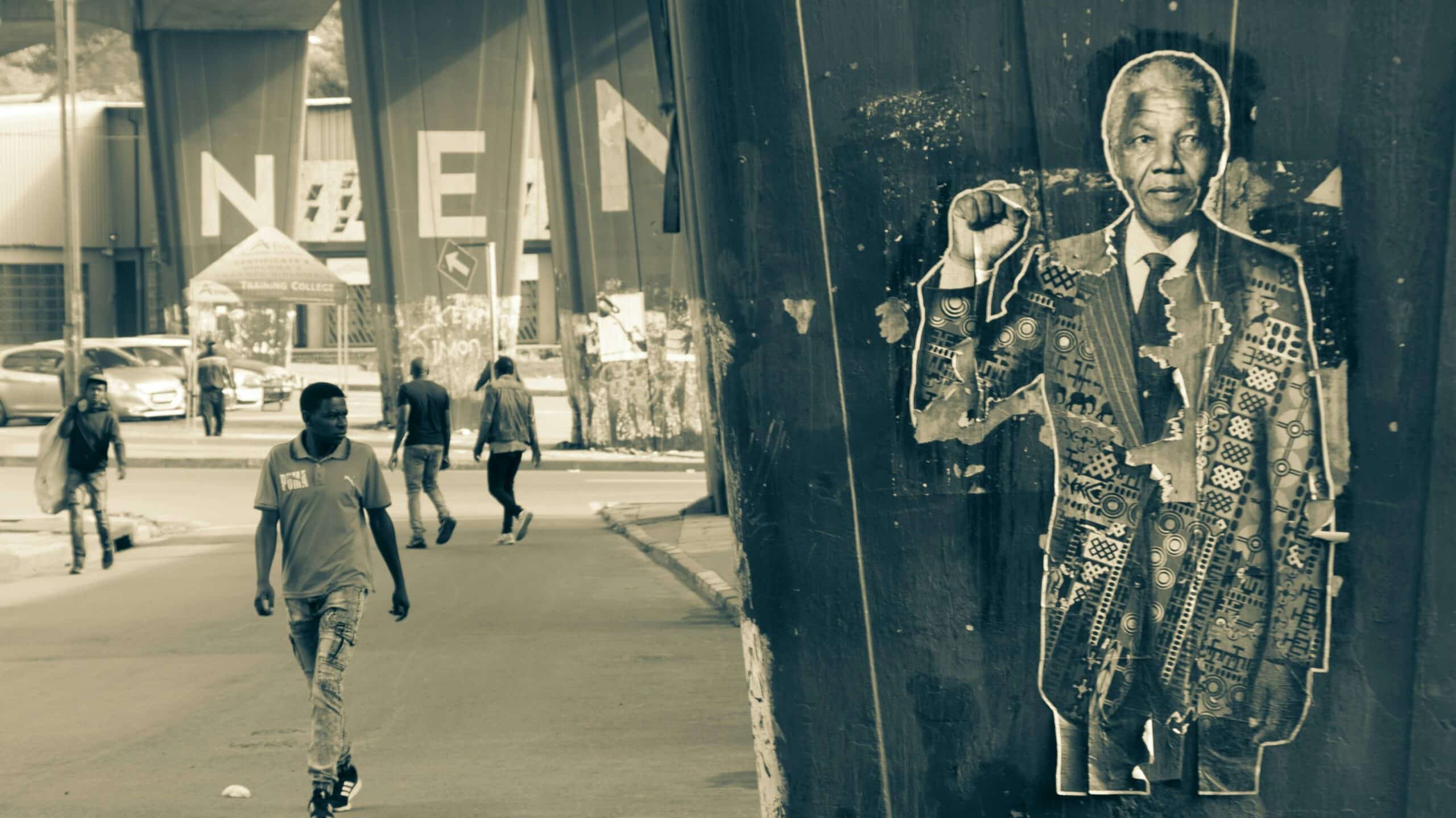
Unsplash – Gregory Fullard
The History of Nelson Mandela International Day
What is Nelson Mandela International Day?
Created by the United Nations in 2009, Nelson Mandela International Day is a day to honour the life and accomplishments of Nelson Mandela.
It’s celebrated on July 18th in commemoration of Mandela’s birthday. Every year, people are encouraged to spend 67 minutes – one for each year of Mandela’s political career – to remember his achievements as a figurehead for South African and global peace movements.
Who was Nelson Mandela?
Nelson Mandela was a revolutionary anti-apartheid leader in South Africa. He spent 27 years in prison for fighting against segregation.
After being freed in 1990, Mandela led the way to seeing the end of apartheid, creating a new, democratic, integrated South Africa. In ’94, he became the country’s first Black President.
Mandela’s work on equality and justice won him the 1993 Nobel Peace Prize, cementing his place as a global icon.
“The true character of a society is revealed in how it treats its children.”
Nelson Mandela
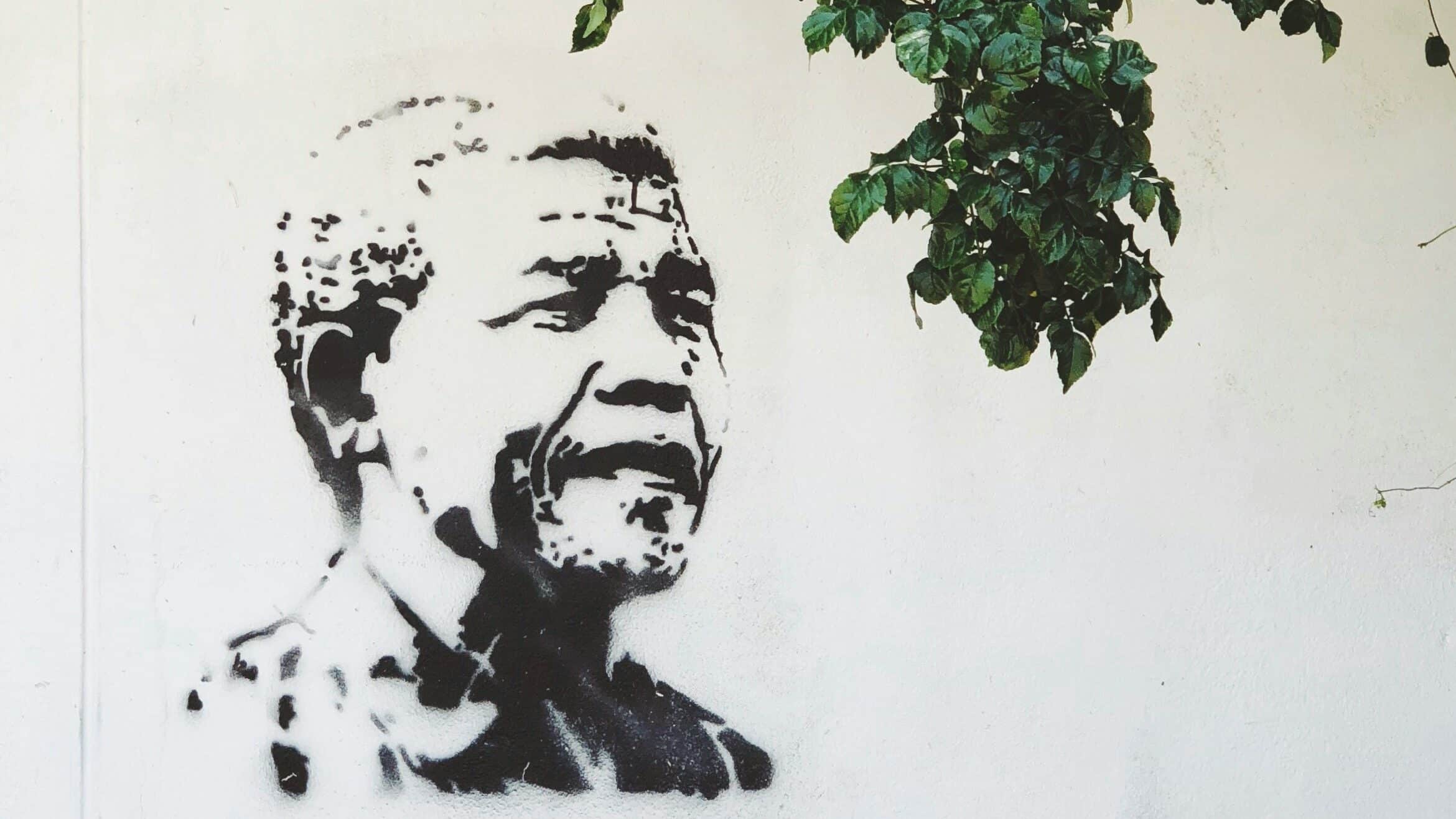
Unsplash – John Paul Henry
Celebrating Nelson Mandela International Day
Why is Nelson Mandela Day important?
Nelson Mandela Day is a huge day on the calendar, and not just in South Africa. It’s a day to honour Mandela’s vision of unity, of peace. It’s also a time to commemorate the ongoing struggle for justice.
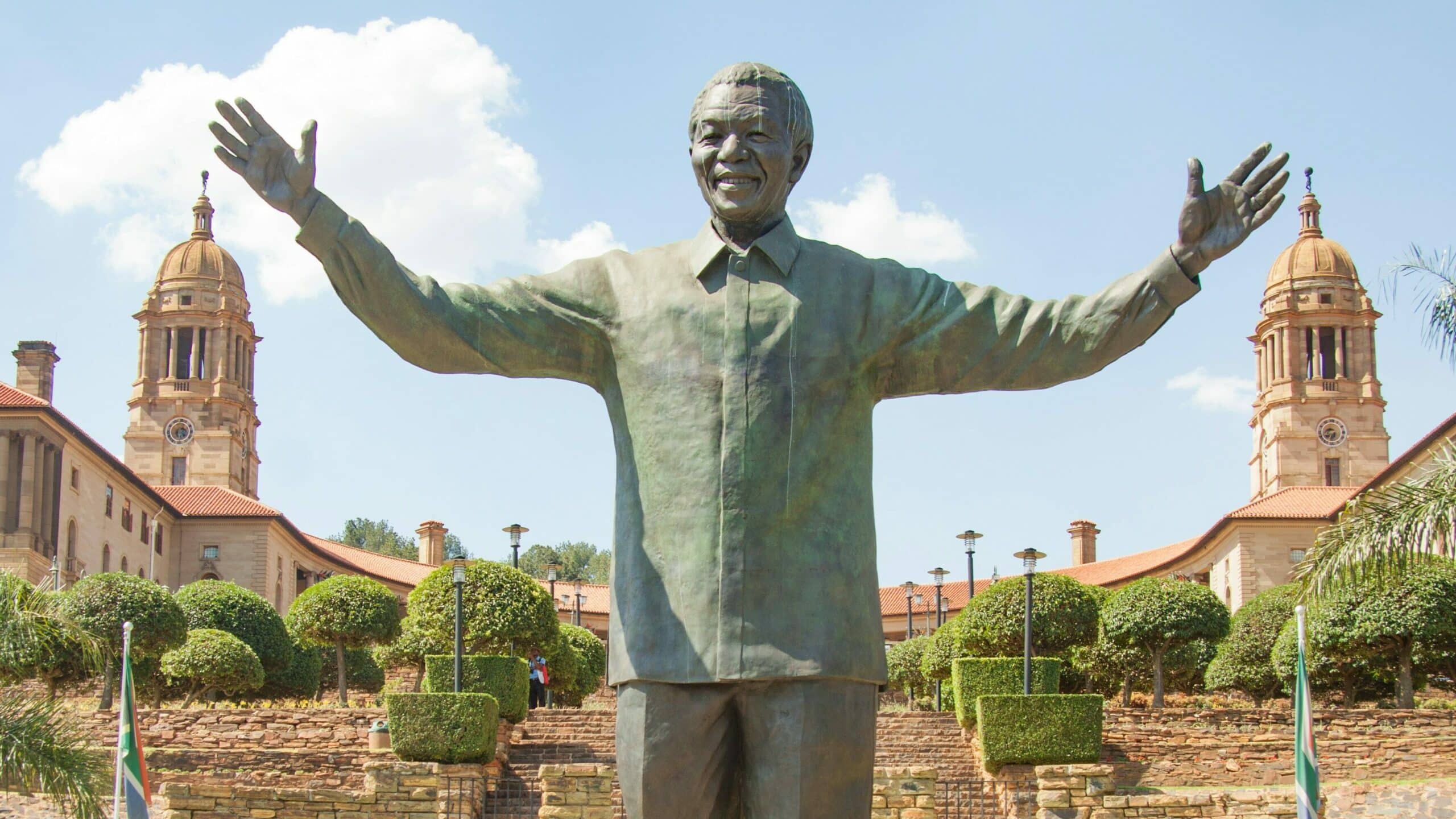
Unsplash – Fogelberg
Our work in South Africa
Bringing strength back to family
Nelson Mandela was a strong advocate for children’s rights. He believed every child deserves a loving, family environment. A place to grow. A place to thrive.
Our children are the rock on which our future will be built, our greatest asset as a nation. They will be the leaders of our country.
Nelson Mandela
Following in Mandela’s footsteps, our team in South Africa works with children, for children. We’re taking steps to secure a bigger, brighter and bolder future for all children in the country. And from education to development, emotional well-being to health, that all comes back to family.
Orphanages in South Africa
Right now, in South Africa, over 8,200 children are growing up inside 282 orphanages. That’s 2,800 children denied their right to family. To love.
And what’s worse, on average, 80% of these children have living families they could be growing up with. Which is exactly what we’re fighting for.
Read more about why children are separated from their families and placed in orphanages.
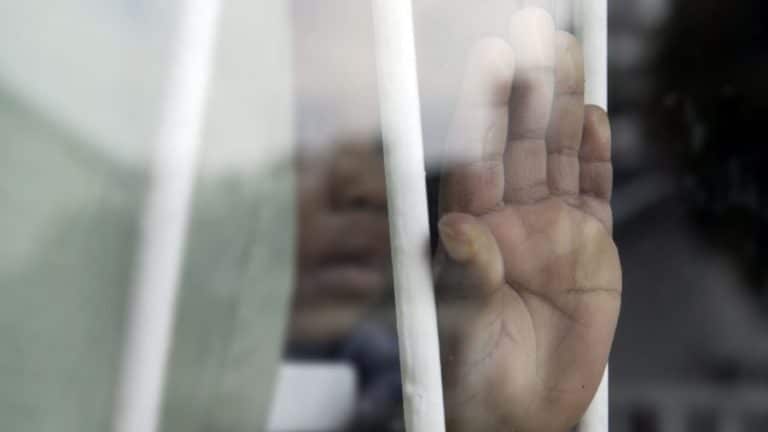
Hope and Homes for Children
How we’re helping
In South Africa, your donations are helping us to transform child care – moving away from orphanages and towards a system that puts family first.
In the Gauteng Province, the largest in South Africa, we’re working on closing down the remaining orphanages and getting the children living inside back to family.
Many of the families we work with face stigma due to HIV/AIDS. We’re helping them access the health, education and welfare services they need to overcome their challenges and be reunited with their children. Read more about how we support families here.
And, we’re preventing any more children from being placed in orphanages by training ‘Temporary Safety Parents’ – emergency foster parents that form the first line of defence against any more children being placed in orphanages, welcoming children into their homes for temporary, safe shelter.
Read more about our life-changing work in South Africa here.
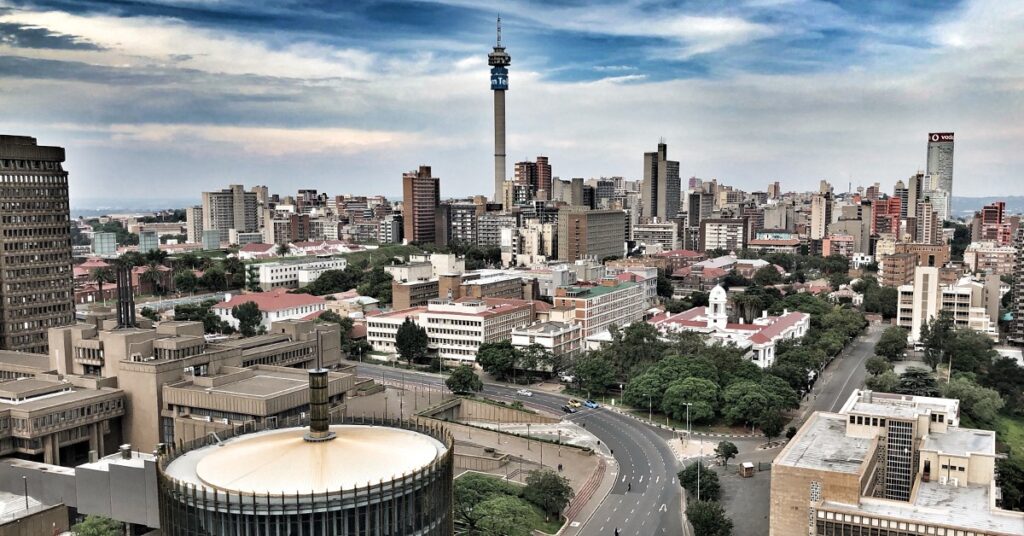
Hope and Homes for Children
Thank you for your support
This Nelson Mandela International Day, join us in celebrating Mandela’s legacy, the progress made by South Africa, and the road ahead as we create a better world for its children. Thank you.
If you’d like to hear more about our work in South Africa – and eight other countries across three continents – sign up to our Mailing List. We’ll keep you up-to-date with the latest news and developments for our life-changing work bringing children back to family.
Join the Mailing List
The post Nelson Mandela International Day 2024: Celebrating a trailblazer appeared first on Hope and Homes for Children.
]]>The post Paris Hilton exposes traumatic institutional child abuse appeared first on Hope and Homes for Children.
]]>“I learned nothing there except trauma.”
These are the words Paris Hilton used to describe her experience in a child care facility. She spent years inside a harmful institution, far from her family, terrified and abused. Sadly, she is not alone.
Currently, there are at least 5.4 million children around the world who are separated from their families, confined in institutions like orphanages – even though 80% of them are not orphans.
Research has shown that the majority of all children in orphanages suffer physical, emotional or sexual abuse. And as Hilton also testified, the trauma suffered in childhood can last a lifetime.
Watch Paris Hilton’s testimony on the harm of institutions.
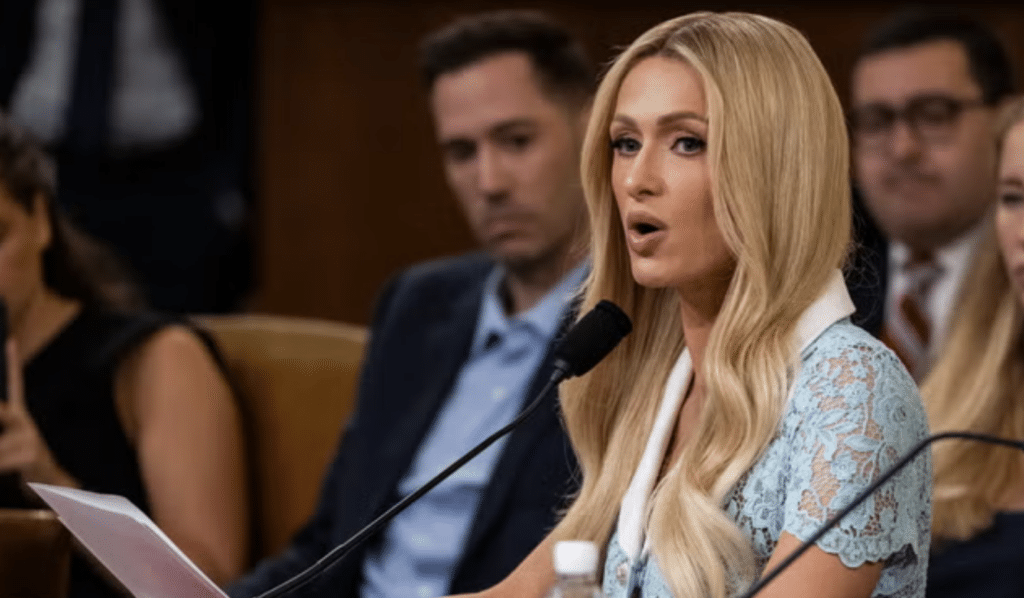
Getty
“I was physically, verbally, and emotionally abused,” said Hilton. “My peers around me were being sexually abused. I was strangled. I was hit. And I was cut off from the outside world.”
“My parents had no idea,” she continues. “They were deceived. Just like the parents of children are really manipulated by these places, the same thing with (my) parents.”
“If you are a child in the system, hear my words: I see you, I believe you, I know what you’re going through and I’m not giving up on you.”
Paris Hilton
Rachel’s* story
Significantly, these painful stories of child abuse in orphanages are all too common around the world. Rachel in Uganda is one with such a story.
Rachel lived with her father and two younger brothers after her parents separated when she was young. When their father passed away suddenly, the children found themselves on the street, and were eventually taken to separate orphanages.
“The staff used to beat us and abuse us.”
Rachel
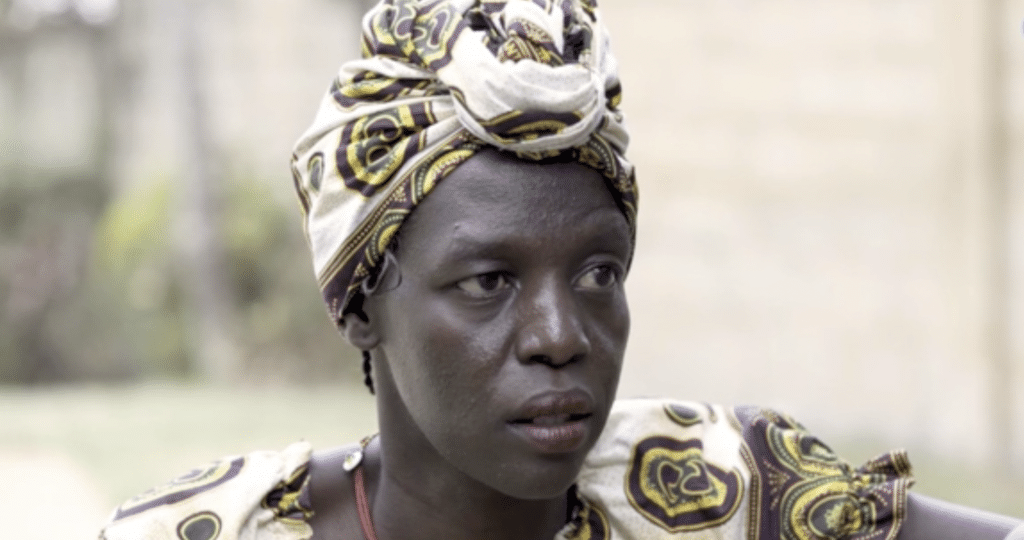
Hope and Homes for Children
Like Paris Hilton’s parents, Rachel’s mother was kept in the dark as well. Then, when her mother tried to visit, she too was beaten up, and denied access to her own child.
A cycle of abuse
Over the next years of her life, the orphanage directors trapped Rachel inside and forced her to do whatever they demanded.
“Instead of going to school, the directors used to take me around to the radio to speak, and we would get a lot of donations and sponsors to the orphanage,” she remembers. “He used to travel everywhere, America. We never saw the money, the whole money went to the orphanage director, not the children.“
Over time, the abuse got worse and worse.
“When I was touring the country with the director of the orphanage, he raped me.”
Rachel
The sexual abuse continued for years. Eventually, Rachel fell pregnant. She was just a teenager.
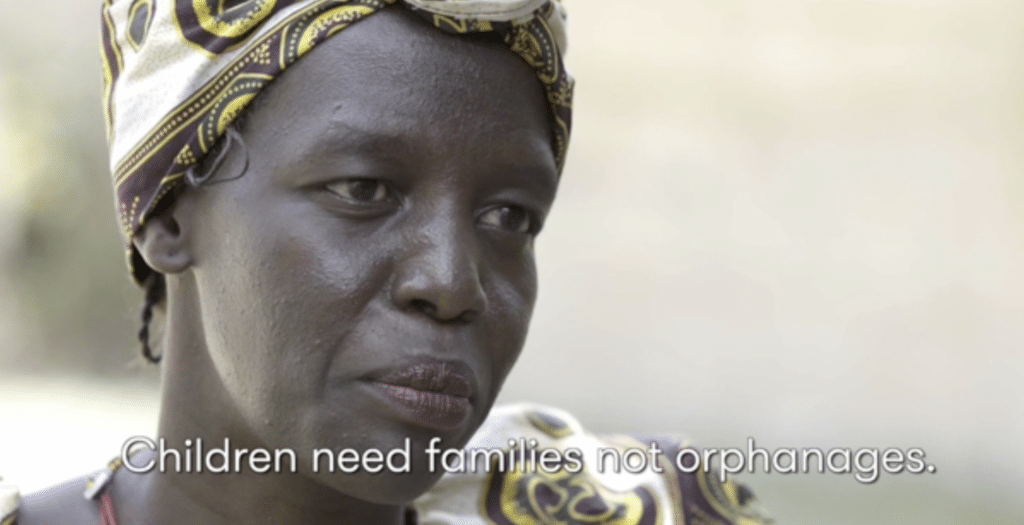
Hope and Homes for Children
Finding freedom
Years later, Rachel managed to escape the terrible confines of the orphanage. But not before she had given birth to two of the director’s children, one who died as an infant and another she had to leave behind at the orphanage.
“He stopped me from seeing my baby. I felt like I was living in prison, and in another way… missing my baby.”
From this pain, Rachel has become committed to telling her story so that people will know the harms of institutional care. This abuse children are suffering in orphanages around the world must end. And it can – by moving the financial, social and community support away from orphanages and back to family.
“I think I would be much better and complete if I grew up with my family and achieved my dreams of being a lawyer.”
Rachel
100 years of research backs her up. Kids do far better in families than in institutions.
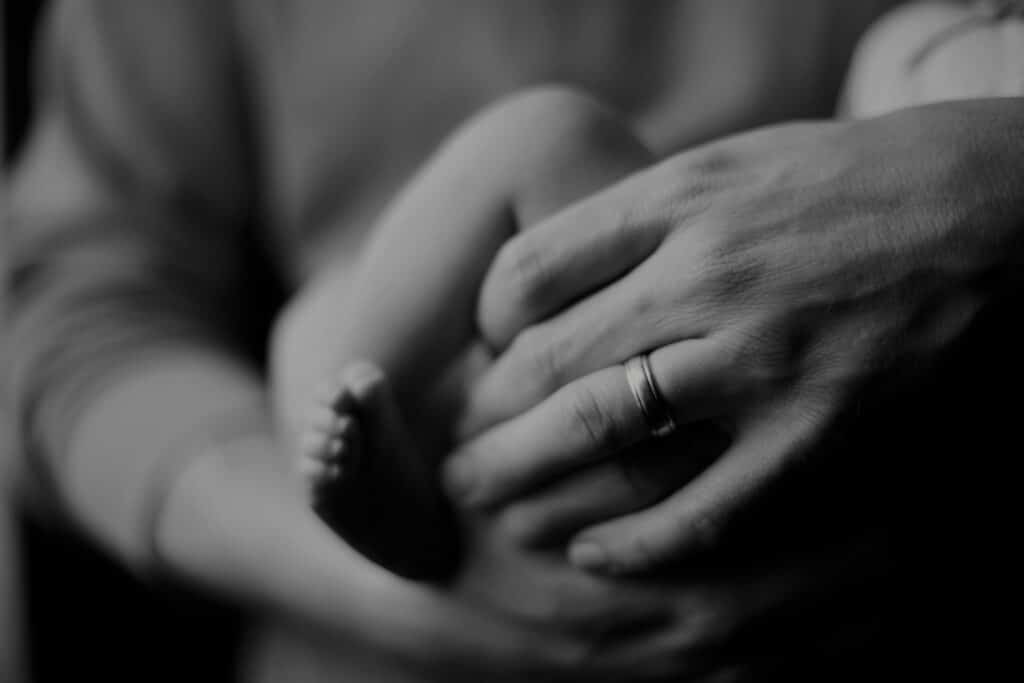
Hope and Homes for Children
Making a change
Let’s hope that Paris Hilton’s brave testimony in the US Congress lets millions more people around the world recognise the harm caused by locking children away in institutions, and the desperate need to get these children back to family.
Read more about the harms of orphanages and how we’re bringing separated children back to family.
If you’d like to keep up to date with more news stories like this, updates on our work, and different ways you can help amplify the voices of young people suffering under institutional care, sign up to our Mailing List.
Join the Mailing List
The post Paris Hilton exposes traumatic institutional child abuse appeared first on Hope and Homes for Children.
]]>The post World Refugee Day 2024 – For a world where refugees are welcome appeared first on Hope and Homes for Children.
]]>Welcome to World Refugee Day – a day dedicated to the strength, courage, and resilience of refugees and forcibly displaced people.
This World Refugee Day, we’re standing shoulder-to-shoulder with the displaced children, adults and families of the world. Because we know that every child deserves to grow up in a safe, loving home. No matter where they’re from.
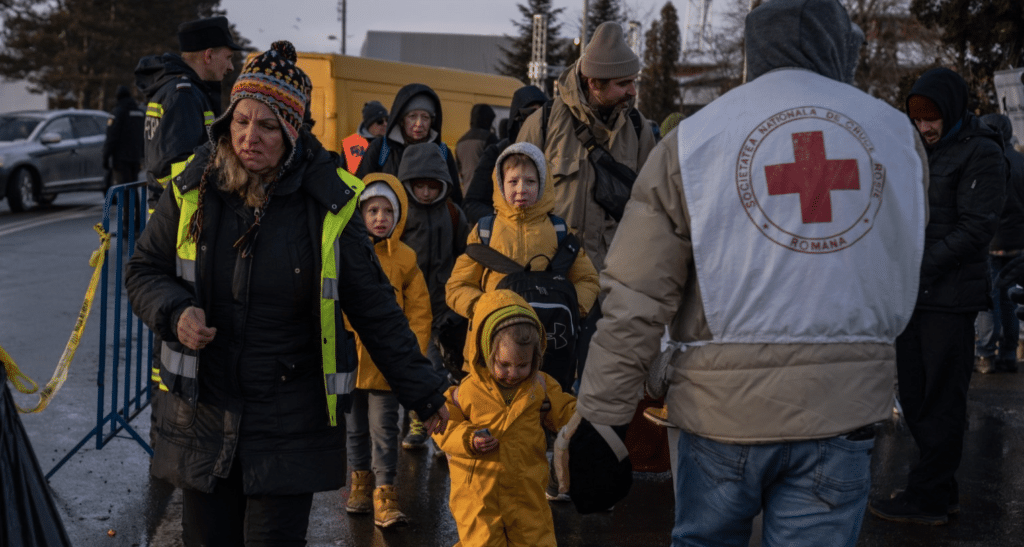
Ioana Moldovan / Hope and Homes for Children
World Refugee Day Facts and Figures
What is World Refugee Day?
The UN created World Refugee Day to raise awareness about the refugee crisis and people forced to flee their homes due to conflict, famine, or persecution.
This year’s theme is “For A World Where Refugees Are Welcome.” It’s a call to champion the universal right to belong – a celebration of home and family, no matter where you;re from.
When is World Refugee Day?
People celebrate World Refugee Day every year on June 20th. The whole week is jam-packed with World Refugee Day events and World Refugee Day activities.
Above all, it’s a day for raising awareness for refugees, understanding their struggles, and promoting actions to improve their lives. It’s also a chance to draw essential attention to the ongoing refugee crisis.
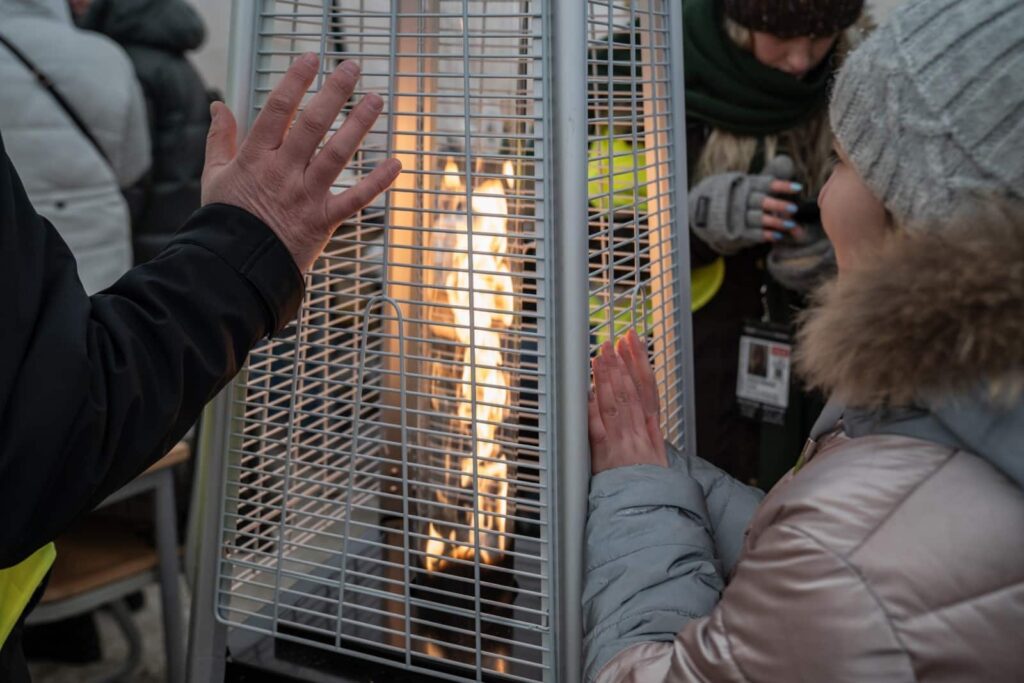
Ioana Moldovan/Hope and Homes for Children
What is the refugee crisis?
The refugee crisis is the ongoing humanitarian disaster that sees millions of people forced to flee their home. Whether it’s due to conflict, war or famine, the number of displaced people is continuing to rise.
Make no mistake – as parts of a global community, the refugee crisis affects us all.
- There are an estimated 108.4 million displaced people around the world, and 35.3 million of them are refugees.
- The UNHCR estimates that there are 43.3 million children who’ve been forcibly displaced, whether it’s in their only country or across the border.
- And it’s getting worse. Every year, an estimated 385,000 children are born into displacement. That’s a whole generation growing up without a home.
The importance of family on World Refugee Day
At Hope and Homes for Children, we believe every child deserves to have a loving, family home. That’s why we’re taking World Refugee Day 2024 as a chance to advocate for refugee children – young people who’ve had their homes taken away from them.
Refugee children and family separation
When communities break down and people are displaced, families can be torn apart. Unfortunately, that means children are at risk of being placed into orphanages. This is especially true for unaccompanied children.
Without family to protect them, young displaced people can be abandoned, abused, or trafficked.
When host countries don’t have the right set-up to care for these children, they often resort to institutionalised care. Refugee camps, detention centres and orphanages are all extensions of the institutionalised care system, which as we know, is no place for a child.

Ioana Moldovan/Hope and Homes for Children
How we’re helping
This year, your support has helped us bring strength back to family all across Ukraine. UNHCR reports that one in three people in Ukraine have fled their homes. 6.3 million became refugees. And 14.6 million still need urgent humanitarian support.
As of February 2024, you’ve helped us support over 131,200 people, including 70,400 children. Children like Daryna*, Mykhailo*, Igor* and Nikita* – all of whom faced displacement in the early days of Russia’s war on Ukraine. Read their stories to find out how you’re helping.
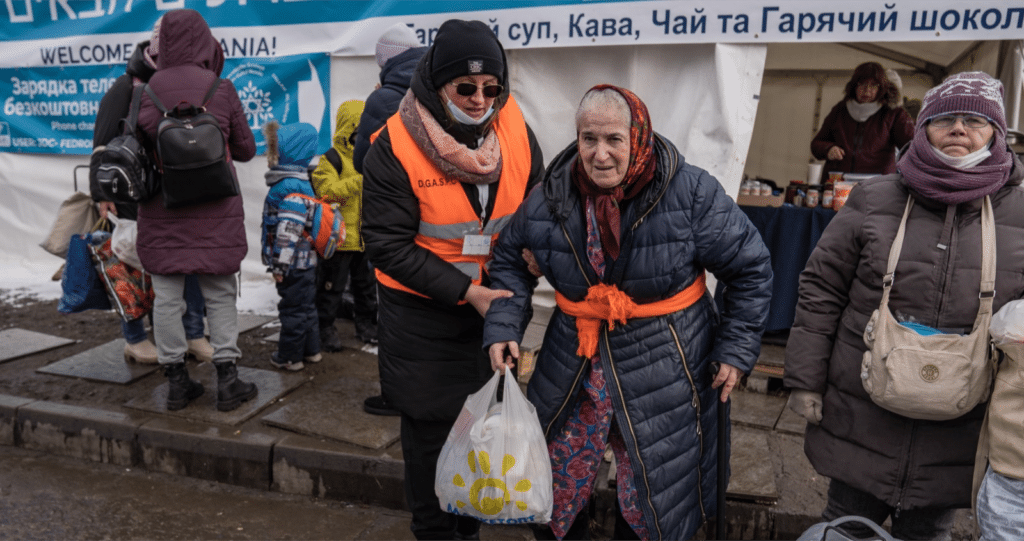
Ioana Moldovan/Hope and Homes for Children
How can you help?
World Refugee Day highlights the critical issue of the refugee crisis. However, displaced individuals need our support throughout the entire year. Here are some ways you can make a difference:
- Donate today: Your generosity’s helping keep families together in crisis zones. Thank you.
- Get informed: Visit the UNHCR website to learn more about the refugee crisis.
- Speak out: Share your support for refugees and displaced people on social media.
We’re all members of a global community, a worldwide family. It’s essential to recognise that everyone deserves a home and a secure environment. Together, we can make changes For A World Where Refugees Are Welcome.

Ionut Stoica / Hope and Homes for Children
Thank you
On World Refugee Day, let’s remember the importance of family, the importance of home. Together, we can say no to family separation – getting children out of harm’s way and back to family.
Join the movement! Sign up for our mailing list and stay in the loop on how you can make a difference for refugee children around the world. Let’s turn awareness into action—together, we can create a brighter future.
Join the mailing list
The post World Refugee Day 2024 – For a world where refugees are welcome appeared first on Hope and Homes for Children.
]]>The post Pride Month 2024: Celebrating the diversity of family appeared first on Hope and Homes for Children.
]]>Welcome to Pride Month 2024, a time to celebrate families in all their wonderful diversity.
Now, we’re taking this month to champion the strength of the global LGBTQ+ community and the importance of loving, supportive families. Because at the end of the day, it all comes Back to Family.
This Pride Month, show your support with our Pride Edition Back to Family T-Shirts. Buy today.
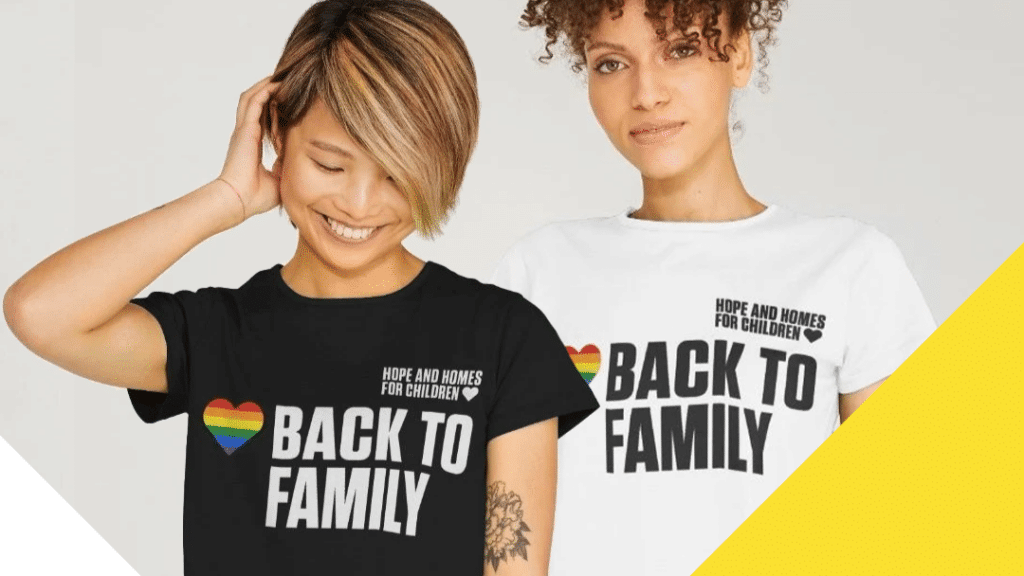
Hope and Homes for Children
Pride Month Facts and History
What is Pride Month?
Pride Month is an annual celebration of the LGBTQ+ community. Taking place all around the world, it’s a month for festivities, activism and tribute to the ongoing fight for equality.
When is Pride Month?
For those wondering “when is Pride Month?”, no need to look too far. Pride Month takes place every June (now!) The whole calendar month is loaded up with events, workshops, parades, and parties.
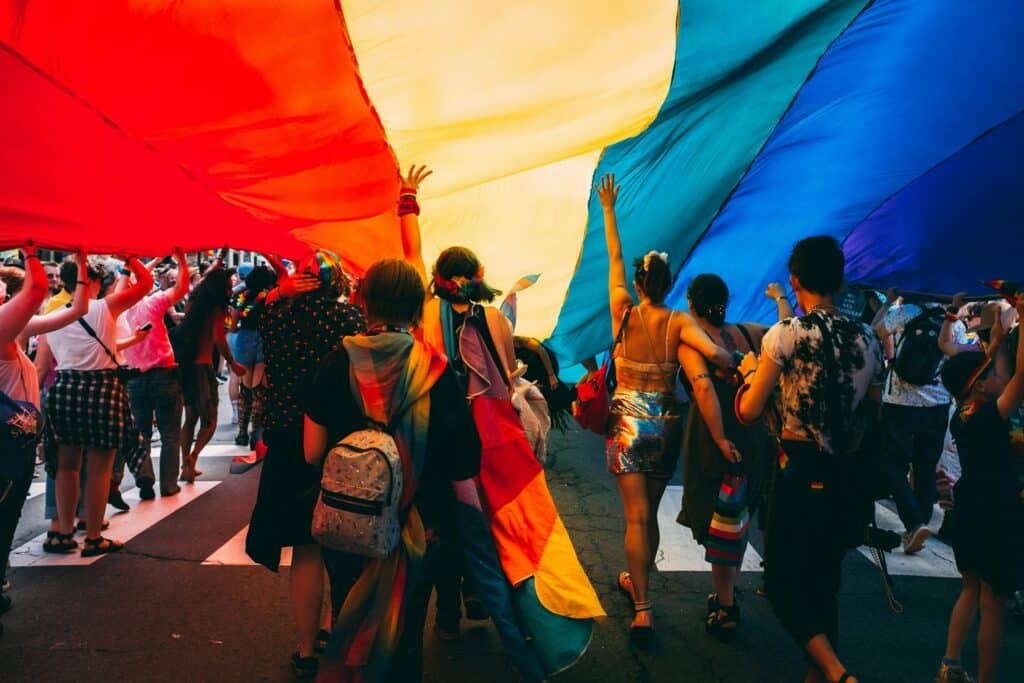
Why is Pride Month in June?
Pride Month is in June in honour of the Stonewall Riots of June 1969 in New York. The Stonewall Riots saw the LGBTQI+ community taking a stand against discrimination. Now, they’re remembered as a pivotal moment in LGBTQI+ history.
What’s happening for Pride Month UK?
The UK’s first Pride March was in 1972. Now, there are plenty of events and activities to take part in right across the country. From London to Manchester, Brighton to Bristol, these events bring together the LGBTQ+ community and allies to celebrate diversity and have fun. Find more Pride Events here.
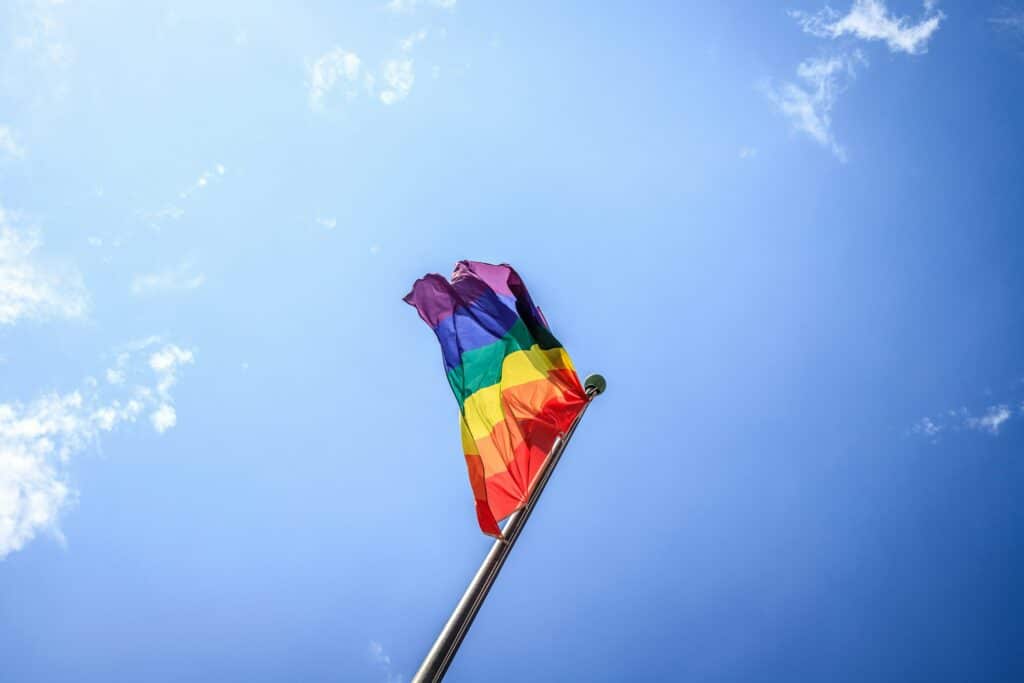
Tim Bieler / Unsplash
Celebrating Pride Month 2024
Supporting family diversity
At Hope and Homes for Children, we know that children need families. Loving families. That’s why, this Pride Month, we’re celebrating the diversity of families, in all their forms.
Why loving families are so important for children
When it comes to a child’s development, it all comes back to family. From community to culture, health to emotional growth, a loving family is the cornerstone of a happy childhood.
Yet right now, 5.4 million children around the world are separated from their families – placed inside orphanages, even though 80% aren’t orphans.
Orphanages expose these children to violence, abuse, and neglect, leading to physical and psychological harm that can last a lifetime. They’re even at risk of trafficking. Children need the personalized care, support, and love of a family home. Never an orphanage.
Read more about how orphanages harm children.

Margaux Bellot / Unsplash
LGBTQI+ youth in orphanages
Sadly, LGBTQI+ youth are at a disproportionate risk of being taken away from their families and placed in orphanages.
In many places around the world, LGBTQI+ youth face rejection, harassment, and even abandonment by their community. Without the right support system in place, they could face institutionalization. But no matter how they identify, every young person deserves safety, support, and love. Every young person deserves a family.
That’s why we work all around the world to bring separated children back to family. And we work to prevent the situations that lead to family separation in the first place. That way, young people can get the chance in life they deserve. All young people.
Find out more about how we work.
How We Can Help
This Pride Month, we’re coming together to show support for loving families all around the world. Here are some fun ways you can get involved:
- Buy our Back to Family x Pride Month T-Shirt – Celebrate your support for families. All families.
- Support a charity that works with LGBTQI+ youth – Head over to Stonewall to find out more.
- Get informed – Find out more about how orphanages harm children and why celebrating families is so important.

Hope and Homes for Children
Thank you
Pride Month 2024 is a time to show our support for equality, peace, and kindness. Thank you for joining us as we celebrate the LGBTQI+ and use this month to champion the power of family.
Together, we’re ensuring that every young person – regardless of their sexual orientation or gender identity – grows up in a loving and supportive environment. Finding their way Back to Family.
Because when you’re loved, you’re limitless.
Once again thank you for reading our Pride Month blog celebrating love and equality! Interested in more stories and updates on how we support diverse families? Subscribe to our mailing list to stay informed.
Join our mailing List
Join our movement Help bring #pride Back to Family
Celebrate the importance of love and the diversity of families
The post Pride Month 2024: Celebrating the diversity of family appeared first on Hope and Homes for Children.
]]>The post Harnessing the potential of EU accession to drive care reform: Spotlight on Ukraine and Moldova appeared first on Hope and Homes for Children.
]]>Currently, all EU funding regulations and relevant policies contain measures for shifting from institutional to family and community-based care, thanks to the continuous, close collaboration between civil society and the EU institutions.
However, we have increasingly been advocating for transferring this approach to the EU accession process.
EU candidate countries share a common aspiration: becoming an EU Member State. To achieve this, they must undertake reforms in a number of areas and align with the EU standards, the so called ‘EU acquis’. As Hope and Homes for Children, we strive to ensure that the EU monitors and supports child protection and care system reform in EU candidate countries, as an integral part of their accession journey.
And we’re starting to see some very promising recent developments.
Advancing care reform throughout Europe
In October, the European Commission recommended further advancement of care reform in all ten 2023 Progress Reports that constitute the EU Enlargement Package. This brings an unprecedented opportunity for simultaneous care reform processes throughout Europe, that could effectively lead to the end of child institutionalisation, and result in children growing up in safe and caring families.
These are just some of the relevant excerpts from the reports:
Learning from the past: European Commission brown bag lunch on child protection and care reform in EU enlargement countries
- De-institutionalisation actions are taking place, but need to be further taken forward at a sufficient pace. (Albania)
- Bosnia and Herzegovina needs to urgently develop and adopt a deinstitutionalisation strategy to move towards community-based care.
- Georgia lacks a national strategy on the de-institutionalisation of children. However, the government has made steps to deinstitutionalise remaining non-state regulated religious residential institutions. Further measures are needed to address the lack of proper standards in boarding schools.
- A comprehensive strategy for child protection is necessary to accelerate deinstitutionalisation and the transition towards quality, family- and community-based care services, including with an adequate focus on preparing children to leave care. (Kosovo)
- …deinstitutionalisation of children with disabilities is progressing, [but] insufficiently qualified staff, lack of resources and poor infrastructure hinder the specialised care and support for institutionalised children with disabilities. (Moldova)
- The deinstitutionalisation strategy, initially planned for Q4 2022, has yet to be adopted. (Montenegro)
- Implementation of the 2018-2027 national deinstitutionalisation strategy continues. This involves a transition from institutional care to family and community-based care with support from social services. (North Macedonia)
- implement and report in good time on the strategies on anti-discrimination that includes the rights of LGBTIQ persons, gender equality, violence against women, and deinstitutionalisation; actively counter hate-motivated crimes and establish a track record of investigation and convictions (Serbia)
- Ukraine should develop and adopt a comprehensive de-institutionalisation reform of childcare and launch its implementation, considering the situation of displaced children in the upcoming year.
- Adequate funding should be directed towards reinforcing community-based care and ensuring proper deinstitutionalisation. Particular concern is caused by the construction of new institutions following the earthquakes and the wars in Syria and Ukraine. (Turkey)
Bringing our experience to bear
Following the Enlargement Package publication, the Commission held an internal webinar, focused on care reform, in close collaboration with us and Lumos. EU representatives, based in Brussels and EU candidate countries alike, joined the online event and shared key EU commitments and initiatives to support child protection and care reform in EU candidate countries. This event was a timely opportunity to discuss current opportunities to promote progress in countries in the process of accessing EU membership with EU staff.
Alongside others, we shared insights from former and ongoing EU accession processes, in particular Bulgaria. Our colleagues gave joint recommendations on how to ensure child protection and care reform is achieved in the midst of the EU accession process. We shared lessons learnt from Bulgaria, where progress is down to resolute political will and technical and financial assistance from the European Union – including pooled resources between the EU Directorate-Generals for Regional and Urban Policy (DG REGIO) and Employment, Social Affairs and Inclusion (EMPL), and collaboration with civil society organisations like us.
Despite this, our experts highlighted that efforts must be maintained to ensure the completion of child care reform in Bulgaria, where four institutions for young children with disabilities remain. This ‘looking back’ exercise resonated with our experts from Ukraine and Moldova; our work in these countries will continue to draw on our years of experience working in past and current EU accession countries alike.
Making care reform a reality
This is all very positive, but in order for care reform to really advance and be completed in a quality and sustainable way, it must be properly funded. This would mean governments making sure that some of the Instrument for Pre-accession Assistance (IPA) III, the Neighbourhood, Development and International Cooperation (NDICI) funding, as well as under any new funding instrument or package, are ringfenced for care reform. As we have been operational in Ukraine and Moldova for decades, it is only natural that we follow more closely the developments in these countries.
Recently, there have been two outstanding opportunities for advancing their care reform: the Ukraine Facility Regulation and the EU Support Package for the Republic of Moldova.
Ukraine
Given
- the objectives listed in the Ukraine Facility Regulation, such as
- contributing to the recovery, reconstruction and modernisation of the country, and
- progressively aligning with the EU acquis
- and the high number of institutionalised children, addressed also in the EC Opinion on Ukraine’s application for membership of the European Union,
it is logical that the Ukraine Facility, and the mirroring Ukraine Plan, support a comprehensive reform of the child protection and care system in Ukraine.
Moreover, the European Commission has already granted €10m to Ukraine for the development of a modern child care strategy. Funding its implementation is the next step for securing family care for the thousands of institutionalised and orphaned children, threatened by Russia’s war of aggression against Ukraine.
As care reform was not included in the original EC proposal, we mobilised eleven key child and disability rights Ukrainian and international organisations and networks around joint proposals for amendments. The European Parliament has taken these on board in their report on the Regulation. We then directed our advocacy efforts towards the Council and the Commission and are now expecting the outcome of the trialogues, the negotiations between the three EU decision-making bodies.
Moldova
Similarly, the EU Support Package for the Republic of Moldova could be instrumental for completing care reform for children in Moldova. Especially, when the 2022-2026 National Child Protection Programme and Action Plan provide the necessary base for completing the care reform of children. The implementation however has been delayed due to lack of resources. Our analysis, endorsed by 11 Moldovan and international organisations, demonstrates that care reform could be funded under two of the three Package priorities: Economic development and connectivity and Administrative capacity. A successfully completed reform in an EU candidate country will set an example for all the other accession and partner countries.
Where there’s a will, there’s a way
Ultimately, systematic inclusion of child care reform as a key, priority requirement for EU accession requires resolute political will.
We believe we can secure this by:
- advocating towards the EU to ensure it champions child care reform in the negotiations towards accession
- supporting national and regional child care advocates, so they can seize opportunities to advocate for child care reform in the context of EU accession.
To support the launch and implementation of care reform in EU candidate countries, we’re currently working on producing guiding documents tailored to these two audiences. These build on our decades of experiences in the European Eastern Neighbourhood region. We are looking at launching them early next year, with the hope that they will be a useful tool for governments, EU institutions and civil society actors, working on care reform for children.
Authors: Irina Papancheva, Marie Raverdeau
New Report
Read the report of our speakers’ presentations at the DG NEAR internal webinar ‘Child protection and care reform in Enlargement Countries’
Child Protection and Care Reform in EU Enlargement Countries
The post Harnessing the potential of EU accession to drive care reform: Spotlight on Ukraine and Moldova appeared first on Hope and Homes for Children.
]]>The post Our contribution to the European Commission’s Recommendation on integrated child protection systems appeared first on Hope and Homes for Children.
]]>This is a significant step towards ensuring that child protection is at the forefront of the policies of the EU Member States and beyond, and a great opportunity to address care reform.
Quality child protection systems focus on upholding children’s rights and protecting them from harm. They are also defined by their ability to prevent unnecessary family separation, and by their capacity to provide adequate alternative family-based care for children, in line with their specific needs and best interests.
In our contribution, we call on the Commission to include the following points in its Recommendation to the Member States:
Address the root causes of family separation and child institutionalisation
Mature child protection systems prioritise preventing situations of risk for children. To prevent family separation and child institutionalisation, it is key to strengthen families, alleviate poverty, champion disability inclusion and provide quality education for all children.
Strengthen legislative and regulatory frameworks, including child protection policies
It is crucial that the right of the child not to be separated from their families and grow up in a loving and stable environment is recognised in the legislative framework of EU Member States.
Establish governance and coordination structures
Collaboration between different sectors such as welfare, education, health, security, justice, and migration is essential to avoid fragmentation in the response, and minimise trauma for children. Therefore, collaborative platforms that bring together community stakeholders, authorities and the civil society are essential. These platforms should be responsible for identification, referrals, and
decisions about child protection and care at both local and national levels.
Ensure a continuum of services
Member States should commit to ensuring family and community-based care for all children. To make this possible, it is necessary to strengthen national social protection systems and ensure a safe transition process for children and young care-leavers, tailored to their individual needs and circumstances.
Secure minimum standards and oversight mechanisms
Formal alternative care settings, including foster care, must meet minimum standards. Measures, indicators and tools, and monitoring and evaluation systems should be in place under the auspices of a national coordinating framework. Member States should assess the availability, accessibility, inclusivity and quality of existing prevention and alternative care services in the community.
Support the child protection systems through human, financial, and infrastructure resources
Services for preventing family separation and providing quality alternative family and community-based care must be well-funded and prioritized. The relevant staff should also be provided with training.
Ensure mechanisms for child participation
It is crucial to ensure continuous engagement of all children and youth within decision-making processes, fostering their active participation and providing them with a platform where their voices can be heard.
Establish data collection and monitoring mechanisms
Member States must comprehensively monitor the situation of children in alternative care, including those with disabilities. This mapping should also include assessing the capabilities of the national social workforce, case management capacity, and the resources within the system.
The European Commission will use this Recommendation as a reference point for child protection systems in the EU. It will also serve as inspiration for EU enlargement countries. Therefore, we hope to see our recommendations linked to care reform in its final text and in the coming months will advocate further for securing this.
The post Our contribution to the European Commission’s Recommendation on integrated child protection systems appeared first on Hope and Homes for Children.
]]>The post “Zelensky’s ambition is to eliminate children’s facilities while he is President.” appeared first on Hope and Homes for Children.
]]>We reflect upon the week of the Ukraine Recovery Conference, why there’s hope for Ukraine’s care reform process, and how domestic political will and international attention has galvanised into commitment to all Ukrainian children growing up in safe, loving families.
The Ukraine Recovery Conference 2023 was co-hosted in London by the Governments of Ukraine and the United Kingdom. Focusing on rebuilding the war-torn country both physically and socially, the conference and associated events were an opportunity for the Government of Ukraine to outline its reconstruction plans. These included an ambitious care reform agenda, and an appeal to international donors to support this process.
We’ve been working in the run-up to the conference, in Ukraine and internationally, to ensure the international attention focused on Ukraine turns into tangible support for an inclusive, sustainable care reform process. In late June, alongside 16 organisations including Save the Children, Lumos, Disability Rights International (DRI) and Human Rights Watch, we published joint recommendations on the reform of Ukraine’s child protection and care system.
Mykolayivka Special Boarding School of General Education, Ukraine, 2016 Photo credit: Aleksandr Glyadyelov.
Securing political will and commitment to care reform
One essential element of making change happen is ensuring the political will to change is unmistakeably there.
The day before the conference, Chatham House hosted a dedicated ‘Road to URC 2023’ event, for civil society to discuss its vital role in Ukraine’s recovery. At the event, Yulia Sokolovska, Deputy Head of the President’s Office of Ukraine, highlighted the level of political support for the care reform agenda by saying “the President’s (Zelensky’s) ambition is to eliminate children’s facilities while he is President.”1
At the conference itself, one session on ‘Human Capital’ had significant focus on care reform. Minister for Social Policy, Oksana Zholnovych, and UNICEF Deputy Executive Director for Partnerships, Karin Hulshof, highlighted the importance of their Better Care agenda, while Darya Kasyanova, Chair of the Ukrainian Child Rights Network, outlined why the need for care reform is so urgent. UK Minister for Development, Andrew Mitchell, referenced the UK’s commitment to supporting Ukraine’s care reform agenda “working to ensure that each Ukrainian child, including children with disabilities, has the opportunity to live in a nurturing family.”2
To secure such consistent commitment to reform on a public stage was a huge step forward. But there was more to come.
"We must make sure every child in Ukraine has the opportunity to be raised in a family."
– Minister Oksana Zholnovych at the Ukraine Recovery Conference side event
International support for a Ukrainian vision of the future of child protection
After the conference, alongside UNICEF, Lumos and the Foreign, Commonwealth and Development Office (FCDO) and the Government of Ukraine, we hosted a side event dedicated specifically to the care reform agenda. Here, Minister Zholnovych presented Ukraine’s ambitious Better Care agenda, and called for all those in the room to join Ukraine and publicly commit to supporting the reform process.
The call was answered by Denise Brown, UN Humanitarian Coordinator for Ukraine, who spoke of the UN’s commitment to supporting the Government of Ukraine’s journey towards care reform and Danae Dholakia, UK Special Envoy for the Ukraine Recovery Conference, who reiterated the UK’s ground-breaking 2018 commitment to support global care reform efforts.
Ukraine’s accession to the European Union
The role of the European Union (EU) in Ukraine’s reform process is key, particularly in the context of Ukraine’s accession journey. The Vice President of the European Commission, Dubravka Šuica, made clear that the EU is ready to rise to this challenge.
“The quality and success of the deinstitutionalisation…will be an important benchmark for measuring Ukraine’s preparedness for accession.”3
– Dubravka Šuica, Vice President of the European Commission
Building back better – together
The clear, public alignment between speakers that ‘the time for reform is now’ is a source of genuine hope that we can make real progress together. In a moving speech, Baroness Helena Kennedy made parallels with the UK’s recovery from World War II, building a stronger social protection system in the aftermath of destruction.
Tellingly, none shied away from the scale of the challenge; all were clear that the Government of Ukraine is not alone in this process. UNICEF is supporting the Government to develop its Better Care agenda. Philippe Cori, Regional Director for Europe and Central Asia, gave a powerful speech highlighting what will be needed to make this reform a success, including support for the social workforce and concrete funding commitments.
Indeed, it is only active involvement from Ukrainian civil society experts can ensure that this reform process is sustainable and inclusive. Halyna Kurylo, of DRI, emphasised the importance of the participation of children and adults with disabilities in the process. Lumos’s Yaroslav Laguta made the key point that the child, and their destiny, must be at the centre of reform. Kasyanova willed all involved to consider more than recovery, and focus instead on development – building a better system than before.
With private sector support also crucial for Ukraine’s recovery, our own CEO Mark Waddington outlined the importance of private sector and civil society collaboration, to ensure resources are allocated towards sustainable, inclusive reform.
This moment was a product of amazing co-operation. Governments, multilateral institutions and civil society came together as partners to present a clear, aligned position on Ukraine’s care reform. This demonstrates we can move closer to a future where no child in Ukraine grows up missing the love and security of a family.
1 – Chatham House – Shaping the New Ukraine – Human capital: healing, reintegration, empowering 1:21:10 https://www.youtube.com/watch?v=6Qek2xP1iEc&list=PLy9ppGFZeRr5N6q5xqrkKYcLtaciG_YXy&index=3
2 – Ukraine Recovery Conference 2023, Investment in Ukraine’s Human Capital Recovery, 55:47 https://www.urc-international.com/ukraine-recovery-conference-urc-2023
3 – https://www.eeas.europa.eu/delegations/united-kingdom/eu%E2%80%99s-support-ukraine%E2%80%99s-comprehensive-child-care-and-child-rights-reform_en
Ukraine Crisis Appeal We need your help
By giving to our regional response across Ukraine, Moldova, and Romania you can help protect children and families right now, and in the aftermath of this war.
The post “Zelensky’s ambition is to eliminate children’s facilities while he is President.” appeared first on Hope and Homes for Children.
]]>